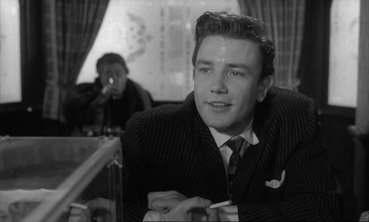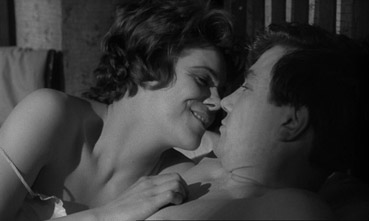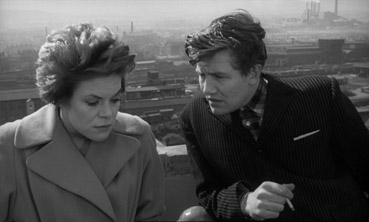| "Don't let the bastards grind you down, that's one thing I've learned." |
| Arthur Seaton |
It could've been a lot different. In the late 1950s Dirk Bogarde was coming to the end of his contract with Rank studios, and was getting increasingly bored with the matinee idol roles he was being offered: he pressed for an adaptation of Saturday Night and Sunday Morning with himself in the lead role in an attempt to flex his thespian muscles. When J. Arthur Rank read Alan Sillitoe's novel he was appalled at the forthright treatment of sex and drinking, and returned the rights to the original owner. Although this makes for a curious historical footnote, it also goes some way to illustrating the completeness, the perfection of Saturday Night and Sunday Morning. Try and imagine Dirk Bogarde as Arthur Seaton, working the lathe at the Raleigh factory and necking pints of bitter: it can't be done. What is offered to us as it stands is the definitive angry young man in the definitive Angry Young Man film.
There's not much plot in Saturday Night and Sunday Morning (SNSM). Set in Nottingham in the late 50s/early 60s, it chronicles the weekends of factory worker Arthur Seaton as he spends his bulging £14 per week pay packet entertaining himself at the pub, bored housewife Brenda in bed and potential partner Doreen at the cinema. Arthur's attempts to hold these worlds together are put under considerable strain when Brenda announces that she's pregnant, and the child is his...

A couple of months ago Network released a special edition of Room at the Top, the film that inaugurated the British New Wave cycle of social realist dramas, and this BFI re-release of SNSM feels like something of a return salvo. SNSM is often considered the definitive film of this movement, appearing on numerous 'greatest films' list for this very reason, but its representative strategies don't sit well with how we've come to think of the New Wave since. Its the complexity, the detail and the shades of grey that make SNSM so compelling and so watchable, even after close to fifty years of social change.
Arthur Seaton is a blue collar working class hero, an angry young man who's very different to the educated, white collar heroes of Room at the Top and A Kind of Loving, both in his outlook and social status. Whereas Joe Lampton and Vic Brown want to move up the social ladder and are angry at the disdain they receive from the middle class, Arthur is something else. Unlike Room at the Top, there are no weekends in the countryside, amateur dramatics or affairs with French forty-somethings for Arthur. Solidly working class, with no ambition to move on, Arthur's resentment is aimed at anyone above who tries to impinge on his world. Whilst fishing with his cousin Bert he rages against those that keep him down; 'I work for the factory, the income tax and the insurance already, that's enough for a bit. They rob you right left and centre. After they've skint you dry you get called up into the army and get shot to death.' Arthur's life is defined by his large pay packet and the measure of freedom that it affords him, and the forces that try to deny him this freedom become the object of his fury. Arthur is constantly talking about work and the money he earns, and other characters likewise talk about him in these terms. Doreen describes him as a 'fast worker' when he first tries to pick her up, he teases a young nephew with a pound note, and even his proposal to Doreen uses this kind of language; 'I'll buy you a ring next week, if you're nice.' However, whereas most kitchen sink films routinely decry the new moneyed working class, drawing a clear cut line between the tacky materialism of the housing estates and the old working class culture, Arthur is seen slightly differently. He spends his money on new suits, gets drunk and flashes his money around, but condemns his parents for their constant television watching and says to Doreen that he'd rather live in an old house than on a modern estate. Its the muddying of the conventional (or, what we now think of as conventional) new wave representations that make Arthur so enduring, but it also helps that he's played by Albert Finney; not only is this some of Finney's best screen work but for my money its the best performance in any British film of the period. Finney gives Arthur intensity, a charisma and humour that all the while suggests there is incredible anger bubbling beneath. He saunters about the film heavy-footed and broad shouldered like John Wayne, he bears his teeth like a gorilla, pulling back his lips and relishing the sharp consonants that fill his dialogue, letting sentences hang much longer than they should but wallowing in the vehemence and weightiness of it all. It also helps that Finney, as a Lancastrian, can effect the most convincing accent of the angry young men – just getting the dialect right counts for a surprising amount of credibility.

It's easy to let Arthur/Albert dominate discussion of SNSM – he certainly dominates the film – but Finney plays opposite two female leads who match him in every scene. Rachel Roberts won a BAFTA for her performance as Brenda, the housewife whose warm, affectionate relationship with Arthur is cruelly ended by pregnancy, an attempt at an abortion and a reluctant acceptance to stay with her straight-laced husband. She ends the film humiliated, beaten and practically alone – Roberts' low-key sadness grows nearly imperceptibility throughout the film; her warmness of demeanour gradually recedes just as Roberts closes off her body and draws into herself, folding her arms and bowing her head further as the film goes on. Paired with Finney's cocky bravado, the work is all the more poignant. On the other side we have Shirley Anne Field as Doreen, more definitely belonging to the new working class, young, confident and sure of what she wants; perfectly willing to let Arthur wait for her on a date, refusing his offers of drinks and insulting his looks. Shirley Ann Field is suitably feisty but also gives Doreen an air of vulnerability that makes her gradual infatuation with Arthur believable but not a complete cop-out (listen to commentator Robert Murphy's attack on those who call the Doreen character misogynist and cheer).
Sillitoe may have wanted to use more of his novel in the film, but there is more than enough excellent dialogue and character here to make every scene enjoyable. Even the minor parts, often overlooked critically, make the film worth watching. Norman Rossington as Bert, Frank Pettitt as Arthur's Dad, Robert Cawdron as gruff factory reminiscer Robboe, and especially Hylda Baker as Aunt Ada all contribute to the endless watchability of the film. Each is written and played with nuance, completeness and engagement that belie the often patronizing attitudes taken to the working class in the British cinema that went beforehand.
Karel Reisz and Freddie Francis marshal the visual aspects of the film, with an eye to realism tempered by more expressive moments, all set to an infectious, sleazy jazz score from John Dankworth. There is a wealth of detail in Saturday Night and Sunday Morning that rewards repeat viewings. Look at Brenda, framed perfectly against a church as she waits for an abortion, or her husband reading a paper with headlines 'He Used to be a Bride' and 'Be Proud of these Men' as she gets ready to go out with Arthur. The terraced streets are filled with extras, kids playing football, mothers with prams, dogs running about; the new housing estates empty and eerily spatious. The interiors are well framed, blocked and edited to give each of them a resonance – Reisz manages to make a two-up two-down feel like a mansion and a semi-dettached bungalow feel like a coffin. The several pubs that are visited throughout the film are given character and ambience with very few shots, and the location work at the factory, the canal and overlooking the grimly beautiful industrial cityscape of Nottingham are sumptuous. The film's standout sequence, in which Arthur courts both Brenda and Doreen at the fair, is a cacophony of carefully choreographed noise, light, movement and cutting that is simply some of the finest film craft you'll ever see.
Saturday Night and Sunday Morning is being released simultaneously on DVD and Blu-ray by the BFI, and the picture quality quality on the DVD under review here makes me itch to get my hands on the Blu-ray version. The 1.66:1 anamorphic transfer is pristine – seriously, you've never seen the film look as good as this unless you're old enough to have caught it on its first run cinema release. The level of detail is terrific, the contrast and tonal range spot-on, and there's hardly a dust spot to be seen. A small scratch on the opening hot is as near as we get to a blemish. A genuinely excellent transfer.

The mono soundtrack may not have the dynamic range of more recent movies and there's a slight treble bias to the dialogue, but it's otherwise clear and clean of any trace of damage or background hiss.
Mixed bag from the BFI here. The full colour accompanying booklet, with an introduction by Philip Kemp, gives a potted history and analysis of the film, as well as a look at the careers of Karel Reisz and Alan Sillitoe, a blurb to We are the Lambeth Boys in addition to Credits, Production Stills, Posters and a page on Free Cinema. It's a neat touch and a nice supplement to the other extras on offer.
Also included is the Karel Reisz documentary We are the Lambeth Boys (49 mins), about a youth club in London. Although the age range is younger than Arthur Seaton, the preoccupation with having a good time and dressing sharply is the same, albeit in a much more supervised way. It's an interesting look at documentary practice at the time (the kids are observed and described as if they were animals in a wildlife programme) and for younger viewers it provides a glimpse into 50s/60s youth culture in quite a direct manner.
There is an Audio Interview with Albert Finney, made up of clips edited together from a NFT interview in 1982. At 4:03 there's nothing ground-breaking here, but Finney does give some small insights into the making of the film, including an amusing observation on how the sex scenes got past the censors.
The Shirley Anne Field Interview is more substantial at 10:07, and contains some rare anecdotes from the production, Fields' recollections of Karel Reisz, Tony Richardson, Freddie Francis et al. Although she's a bit too eager to give us examples of her northern accent, Shirley Anne Field speaks with authority on what it was like working as a young actor at the time, and the buzz around the new wave films (interestingly, she takes offence at the use of the term 'kitchen sink')
The money extra is the Commentary with Alan Sillitoe, Freddie Francis and film historian Robert Murphy. What's disappointing here is that the only commentary is from Murphy, who talks with expertise about the social and cultural context of the film together with moments of closer analysis. Sillitoe and Francis' contributions sound like they have been pasted in from interviews, and so very often what they are talking about has little bearing on the action occurring onscreen: during an important fight scene, we hear from Francis who talks about what it was like working with John Houston. Although what Francis and Sillitoe say is intriguing and helpful, its doubtful whether a commentary track is the best place for them.
In my book one of the greatest films ever made, and I don't say that lightly. Enrapturing, honest, and mesmerizing, the story is told with pace and pathos that can be returned to time after time. This BFI disc is the best release so far, well presented and with a couple of decent extras (despite my misgivings on the commentary track). Buy it.
|